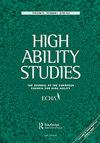How children’s intellectual profiles relate to their cognitive, socio-emotional, and academic functioning
IF 1.8
4区 教育学
Q2 EDUCATION, SPECIAL
引用次数: 12
Abstract
ABSTRACT Intellectual abilities are consistently found to be associated to child functioning. To date, however, it is unclear how varying intellectual profiles relate to differential aspects of child functioning. We screened 513 fifth-grade children on their intellectual abilities and selected three groups of gifted children, scoring in the top 10%: analytically gifted (n = 14), creatively gifted (n = 18), and analytically creatively gifted (n = 13). Of the remaining typically developing children, a group of 152 children was selected. We examined how these groups differed in cognitive, socio-em otional, and academic aspects of child functioning. A comparison of the gifted group as a whole versus the typically developing group, showed higher scores for the gifted group on cognitive functioning, self-concept, and academic functioning. Fine-grained group comparisons showed especially the analytical-creative subgroup to score higher than the typically developing group on visual and verbal short term memory (STM), motivation, and self-concept. Furthermore, both creatively gifted subgroups outperformed the typically developing group regarding vocabulary, while all three gifted subgroups outperformed the typically developing group regarding arithmetic. A combination of high analytical and creative abilities, which was found in 2.5% of the sample, thus seemed to lead to enhanced functioning in all three domains (i.e. cognitive, socio-emotional, and academic). Abbrevation: STM = Short term memory HSD = Honestly Significance Difference儿童的智力状况如何与他们的认知、社会情感和学业功能相关
智力能力一直被发现与儿童功能有关。然而,到目前为止,还不清楚不同的智力特征与儿童功能的不同方面之间的关系。我们对513名五年级儿童的智力能力进行了筛选,并选择了得分在前10%的三组天才儿童:分析型天才(n = 14),创造性天才(n = 18)和分析型创造性天才(n = 13)。从其余发育正常的儿童中,选出152名儿童。我们研究了这些群体在儿童功能的认知、社会情绪和学术方面的差异。一项将天才组作为一个整体与正常发展组的比较显示,天才组在认知功能、自我概念和学术功能上得分更高。细粒度的小组比较显示,特别是分析创造性小组在视觉和语言短期记忆(STM)、动机和自我概念方面的得分高于典型发展小组。此外,创造性天才小组在词汇方面的表现都优于典型发展组,而三个天才小组在算术方面的表现都优于典型发展组。在2.5%的样本中发现,高分析能力和创新能力的结合似乎导致所有三个领域(即认知,社会情感和学术)的功能增强。缩写:STM =短期记忆HSD =诚实显著性差异
本文章由计算机程序翻译,如有差异,请以英文原文为准。
求助全文
约1分钟内获得全文
求助全文
来源期刊

High Ability Studies
Multiple-
CiteScore
4.80
自引率
11.10%
发文量
7
期刊介绍:
High Ability Studies provides a forum for scholars in a variety of disciplines associated with the development of human abilities to their highest level. It is a medium for the promotion of high ability, whether through the communication of scientific research, theory, or the exchange of practical experience and ideas. The contents of this journal are unique in reflecting concerns and recent developments in this area from childhood and across the whole life span in a variety of contexts. Far from being restricted to the traditional focus on high-level cognitive development, it also presents investigations into all other areas of human endeavour, including sport, technology, the arts, business, management and social relations.
 求助内容:
求助内容: 应助结果提醒方式:
应助结果提醒方式:


